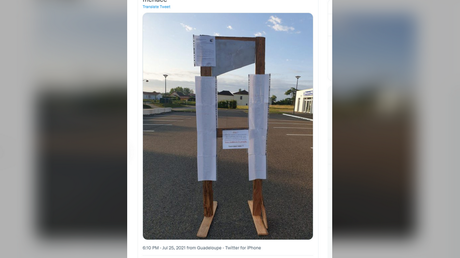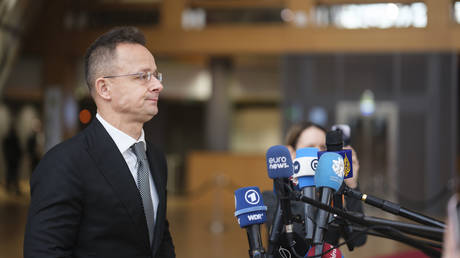
A man in France has been charged with threatening politicians by attaching their names to makeshift guillotines. He claimed it was in protest at the country’s Covid-19 restrictions.
A 50-year-old man from the southwestern Landes region will be tried in October for making “death threats against public officials,” a local prosecutor’s office said.
The suspect, who was identified through CCTV footage and detained on Thursday, set up dummy guillotines in the towns of Saint-Sever, Samadet, and Geaune last week. Sheets of paper with the names of 382 mayors were attached to the devices.
The listed officials had all put their names to a recent opinion piece in the Le Journal du Dimanche newspaper, in which they had “saluted the courage” of the decisions made by President Emmanuel Macron, including the introduction of a health pass.
The suspect was quoted by the AFP news agency as saying the guillotines were made of wood and cardboard, and not intended to be perceived as a death threat. He said he wanted to “alert the mayors to the violations of fundamental freedoms by the government’s decisions” during the pandemic.
Nevertheless, Pascale Requenna, the mayor of Hagetmau and a regional councilor, told the media she had been frightened by the installations and, along with Samadet Mayor Bernard Tastet, had filed a police complaint.
“The symbol of the guillotine is unbelievably violent,” Requenna said. “We have the right to fight with words and ideas, but to use symbols like the guillotine to challenge the positions of elected officials – I find it distressing, violent, and extremely serious.”
A symbol of terror during the French Revolution, the guillotine was last used to execute a criminal in France in 1977. A dummy version of the lethal device has since been spotted during anti-government protests, such as those organized by the Yellow Vest movement.
France has strict laws against threats to public officials. In 2019, a protester was detained for merely shouting the word “guillotine” at a politician from Macron’s party, the Republic on the Move (LaREM).
The health passes to which the suspect was objecting serve as proof that a person has been fully vaccinated, has tested negative for Covid-19 within the past 48 hours, or has recovered from the virus.
From August 9, people in France have to show such a pass to visit cafés and restaurants, or board planes and inter-city trains. The pass is already required for visits to museums, cinemas, and cultural venues with a capacity of more than 50 people.
The authorities say the strict measures are necessary to curb the spread of the more contagious Delta variant of the coronavirus. The introduction of the health pass has faced protests across the country, however, with activists insisting it infringes on peoples’ freedoms.
Think your friends would be interested? Share this story!




